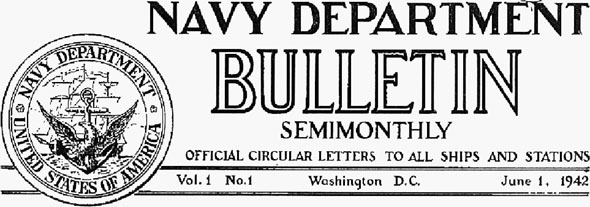 |
||||||||||||
CONTENTS |
||||||||||||
OFFICE OF THE CHIEF OF NAVAL OPERATIONS |
||||||||||||
|
||||||||||||
OFFICE OF THE CHIEF OF NAVAL OPERATIONS
|
||||||||||||||||||||||
|
||||||||||||||||||||||
|
||||||||||||||||||||||
1. Reference (a) is hereby cancelled and all copies will be destroyed. Enclosure (A) to reference (a) will be retained for use with this letter. |
||||||||||||||||||||||
2. The following instructions for the handling and interrogation of prisoners of war captured by vessels of the United States Navy are based on the practical experience of the British Navy during the present war. It is imperative that all officers be familiar with these instructions and that they be strictly adhered to if information of value to the service is to be obtained. |
||||||||||||||||||||||
PROCEDURE FOR HANDLING PRISONERS OF WAR |
||||||||||||||||||||||
|
||||||||||||||||||||||
June 1, 1942 NAVY DEPARTMENT BULLETIN OpNav |
||||||||||||||||||||||
A44033 |
||||||||||||||||||||||
C-1 |
||||||||||||||||||||||
C-2 |
|||||||||||||||||||||||||||||||||||||||||||||||
|
|||||||||||||||||||||||||||||||||||||||||||||||
|
|||||||||||||||||||||||
|
|||||||||||||||||||||||
3. On every ship or station there can probably be found some among the officers and men with a knowledge of the language needed. One or more should be selected to act as interpreters in dealing with the prisoners. Those so detailed should be men of great patience and forbearance and with a considerate and sympathetic manner. The men so detailed should be the only members of the ship's company permitted to hold any conversation with the prisoners. |
|||||||||||||||||||||||
4. Officers and men detailed as interpreters should be present with the prisoners during meals and during their periods of exercise or relaxation. From conversations overheard or from casual conversation (NOT INTERROGATION) with the prisoners some information may be gained. |
|||||||||||||||||||||||
5. If sufficient men with language qualifications are available, one or more additions may be detailed to assist the prisoners or as part of the guard. These men should not divulge their knowledge of the language to the prisoners and should never speak in the prisoner's language in their hearing. They may, in this way, pick up information of value from conversations overheard between prisoners. |
|||||||||||||||||||||||
6. A complete written record of such information should be made and copies included with the personal possessions and papers turned over to the shore authorities. |
|||||||||||||||||||||||
June 1, 1942 NAVY DEPARTMENT BULLETIN OpNav |
|||||||||||||||||||||||
C-3 |
|||||||||||||||||||||||
C-4 |
||
7. Enclosure (A) is forwarded for information. Although the instructions contained therein apply primarily to shore activities it will explain and clarify the reasons for the instructions contained herein and emphasize the necessity of strict compliance in order that our "team work" may carry through to a successful conclusion. |
||
8. While the provisions of this letter are primarily applicable to operations in or adjacent to the coastal waters of the United States, where there will be the least delay in bringing ashore prisoners of war, they are set forth as a model for the handling of prisoners of war by all commands. Experience has shown that most favorable results can be gained through this procedure and it should be adhered to in operations in more remote areas so far as circumstances will permit. |
||
9. The necessity for strict adherence to these instructions is well illustrated by an incident which recently occurred. After successfully sinking an enemy submarine the commanding officer and a large number of the crew were rescued by the engaging vessel. When the prisoners were on board the captain took advantage of the opportunity to harangue them on the necessity of maintaining silence on all matters of interest to their captors. When his harangue was understood by members of the capturing vessel's crew he was restrained from continuing. However, the damage had been done and a well disciplined, security conscious company of prisoners arrived ashore. During the passage to port there was also a large degree of fraternizing between prisoners and crew members which further assisted in building up enemy morale and in making the interrogators' task most difficult if not impossible. |
||
F. J. HORNE. |
||
OFFICE OF THE CHIEF OF NAVAL OPERATIONS
|
|||||||||||||||||
|
|||||||||||||||||
|
|||||||||||||||||
1. Reference (a) is hereby superseded. |
|||||||||||||||||
2. In view of the present enemy submarine operations close to American shores, the possibility of sinking an enemy submarine must be reckoned with. Under favorable conditions an enemy submarine so sunk would present an opportunity for the recovery of documents, personal effects and equipment of the highest intelligence value to our forces in the conduct of anti-submarine warfare. |
|||||||||||||||||
3. It must be realized by all members of our armed forces that if knowledge of the recovery of such material reaches the enemy immediate steps will be taken to offset the advantage we may have gained. Furthermore, much information painstakingly compiled from other sources would be jeopardized, if not completely nullified, by such enemy countermeasures. |
|||||||||||||||||
4. The following instructions are issued for the guidance of Commanders of Sea Frontiers and District Commandants: |
|||||||||||||||||
|
|||||||||||||||||
June 1, 1942 NAVY DEPARTMENT BULLETIN OpNav |
|||||||||||||||||
C-5 |
|||||||||||||||||
C-6 |
|||||||||||||||||||||||||||||||||||||||||||||||
|
|||||||||||||||||||||||||||||||||||||||||||||||
5. In consideration of the natural and understandable desire for souvenirs of any action with the enemy, the Office of Naval Intelligence will undertake to set aside such articles received which have no technical or intelligence value to be returned to the Commanding Officers of the forces effecting the sinking and recovery for distribution to such of their personnel as they may deem fit. |
|||||||||||||||||||||||||||||||||||||||||||||||
6. It is not expected that the recovery of materials from any one submarine will yield a complete picture of enemy operations. However, any material of whatever nature may prove to be of great value when considered in conjunction with other information assembled from other sources. |
|||||||||||||||||||||||||||||||||||||||||||||||
F. J. HORNE. |
|||||||||||||||||||||||||||||||||||||||||||||||